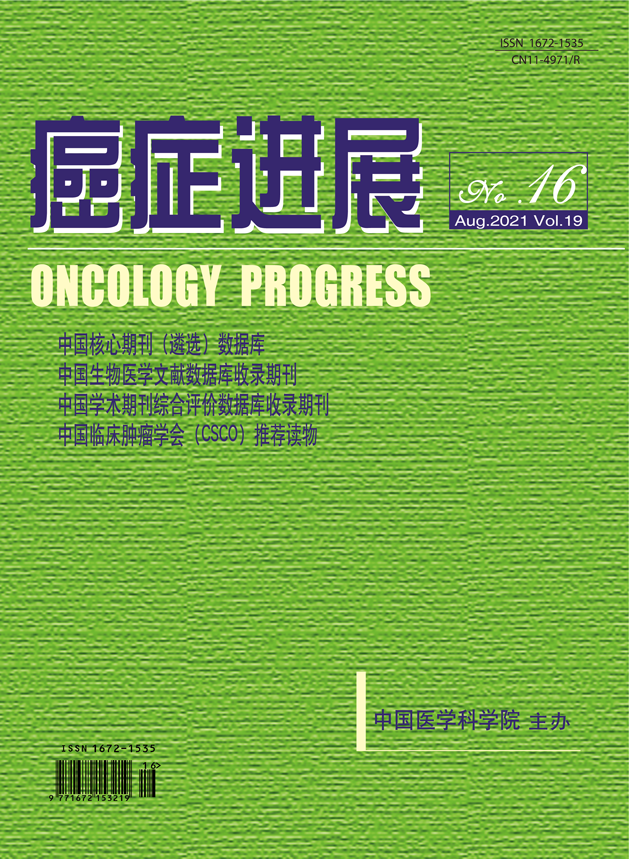杂志信息/Information

- 刊名:癌症进展
- Oncology Progress Journal
- 主管:国家卫生健康委员会
- 主办:中国医学科学院
- 社长:张凌
- 主编:赵平
- 编辑部主任:穆红
- 出版单位:中国协和医科大学出版社有限公司
《癌症进展》编辑部
100730,北京东单三条9号
联系电话:010-57528109
E-mail:azjzzz@163.com
http://www.aizhengjinzhan.com - 印刷:北京联合互通彩色印刷有限公司
- 国内统一连续出版物号:CN 11-4971/R
- 国际标准连续出版物号ISSN 1672-1535
下载专区/Download
订阅电子期刊/Subscribe
提交您的邮箱地址,我们会定期将电子期刊 发送到您的邮箱
期刊检索/Journal Search
扫一扫,关注

2015 年第 4 期 第 13 卷
雷帕霉素抑制mTOR通路增强卵巢癌细胞系对顺铂的敏感
作者:
单位:
- 摘要:
- 【摘要】目的 研究雷帕霉素对卵巢癌细胞系顺铂敏感性的影响;mTOR信号通路与卵巢癌细胞系顺铂耐药相关性;初探雷帕霉素增强卵巢癌细胞系顺铂敏感性的分子机制。方法 CCK-8法检测耐药指数、细胞增殖抑制率;克隆平板实验观察不同用药方案对两种细胞系克隆形成的影响;Western blot检测两种细胞系蛋白表达差异。结果 (1)顺铂耐药细胞系SKOV3/DDP耐药指数为6.10,属中度耐药。(2)SKOV3细胞系,顺铂联合雷帕霉素24h、48h细胞增殖抑制率明显高于单用顺铂组,差异显著(P<0.01),72h,两组间无明显差异(P>0.05);耐药细胞系SKOV3/DDP,顺铂联合雷帕霉素24、48、72h细胞增殖抑制率均明显高于单用顺铂组,差异显著(P<0.01)。(3)SKOV3细胞系,雷帕霉素联合顺铂作用4h,其克隆形成抑制率明显高于单用顺铂组,差异显著(P<0.01)。(4)SKOV3/DDP细胞系比SKOV3细胞系p-mTOR、p-AKT表达升高,而mTOR、AKT表达相似。(5)联合用药组比单用顺铂PARP断裂增加。(6)雷帕霉素作用SKOV3细胞系24h,Bcl-2表达下调,LC3B由LC3BI向LC3BII转化增加;SKOV3/DDP细胞系未发现这两种作用。结论 (1)体外培养条件下,雷帕霉素能增强SKOV3及SKOV3/DDP细胞系对顺铂的敏感性。(2)mTOR信号通路激活可能在卵巢癌细胞系顺铂耐药中起重要作用。(3)雷帕霉素增强SKOV3细胞系对顺铂敏感性的分子机制包括:增强顺铂致DNA断裂、下调抗凋亡蛋白Bcl-2及引起细胞自噬;增强耐药细胞系SKOV3/DDP对顺铂敏感性分子机制可能与增强顺铂致DNA断裂有关。
- Objective (1) The study is aimed to learn the influence of rapamycin on the sensitivity of cisplatin in ovarian cancer cell lines. (2) To investigate the relationship between the mTOR signaling pathway and cisplatin-resistance in ovarian cancer cell lines. (3) To research the molecular mechanism of the cytotoxic effects of rapamycin on ovarian cancer cell lines. Methods (1) The resistance index and cell proliferation inhibition rate were analyzed by CCK-8 assay. (2) After the therapy of different regimens, the influence of colony formation on the two cell lines were evaluated by clone tablet experiment. (3) The different expression of proteins in both cell lines were disclosed by Western blot, including pathway-associated proteins: AKT, p-AKT, mTOR, p-mTOR and cell proliferation inhibition-related proteins: Bcl-2, LC3B, PARP. Results (1) The Resistance Index of SKOV3/DDP cell line was 6.10, and cell line was moderately resistant to cisplatin. (2) In SKOV3 cell line, the cell proliferation inhibition rate of combining groups were significantly higher than cisplatin groups in 24h and 48h (P<0.01), while there was no statistical difference in 72h (P>0.05). In SKOV3/DDP cell line, the cell proliferation inhibition rates of combining groups were significantly higher contrast to cisplatin groups in 24h, 48h, 72h, and there were statistical difference (P<0.01). (3) In SKOV3 cell line, when cells were incubated with combined cisplatin and rapamycin for 4h, the colony formation inhibition rate was significantly higher contrast to the cisplatin groups (P <0.01). (4) Gray-scale analysis showed that p-mTOR and p-AKT were overexpressed in SKOV3/DDP, while mTOR, AKT had the same expression levels. (5) The combination of rapamycin and cisplatin had an increased cleavage of PARP compared with cisplatin groups. (6) SKOV3 cell line had a decreased expression of Bcl-2, an increased transform from LC3BI to LC3BII when cell line was treated with rapamycin for 24 hours; In SKOV3/DDP cell line, such phenomenon was not found when cell line was incubated with rapamycin for 24 hours. Conclusions (1) In vitro, rapamycin can enhance the chemosensitivity of SKOV3 and SKOV3/DDP cell lines to cisplatin. (2) The activation of the mTOR pathway may play an important role in the development of cisplatin-resistance. (3) Rapamycin increases the chemosensitivity of SKOV3 cell line to cisplatin, the underlying molecular mechanisms may include: enhancement of cisplatin-induced DNA cleavage, downregulation of Bcl-2 and induce of autophagy, while the mechanisms involved in SKOV3/DDP cell line only include the enhancement of cisplatin-induced DNA cleavage.








